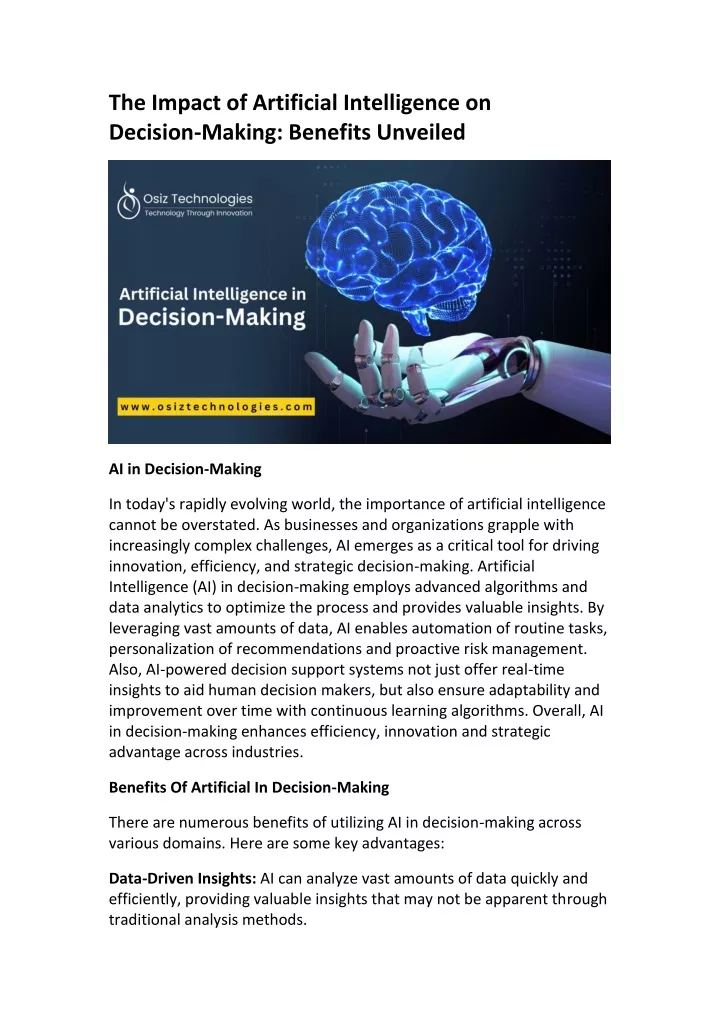In today’s fast-paced business landscape, the ability to make informed decisions quickly can set a company apart from its competitors. Artificial intelligence is emerging as a powerful ally in this endeavor, offering insights that go beyond traditional analysis. By harnessing AI, decision-makers can unlock patterns and trends hidden within vast datasets, enabling more strategic and data-driven choices. This transformative approach not only enhances operational efficiency but also fosters agility in responding to market demands, paving the way for innovative solutions and sustainable growth. Embracing AI insights is no longer a luxury; it’s a necessity for organizations aiming to thrive in an increasingly complex world.
Table of contents
ToggleThe Role of AI in Modern Decision-Making
In today’s fast-paced environment, the integration of AI into the decision-making process has emerged as a game changer. Organizations increasingly rely on AI to analyze vast amounts of data, gaining deeper insights that inform their strategies and actions.
The role of AI in modern decision-making encompasses various facets:
- Data Analysis: AI systems can process and analyze large datasets in a fraction of the time it takes traditional methods, revealing patterns and trends that might be overlooked.
- Predictive Analytics: Utilizing historical data, AI can forecast future outcomes, allowing businesses to make informed decisions proactively rather than reactively.
- Cost Reduction: By automating routine tasks and optimizing processes, AI can significantly lower operational costs, freeing up resources for strategic initiatives.
- Enhanced Customer Insights: AI-driven analytics can uncover customer behaviors and preferences, enabling more targeted marketing strategies and improving customer satisfaction.
The ability to harness AI insights effectively empowers decision-makers to navigate complex challenges with agility. The combination of speed and precision in data handling ensures that organizations remain competitive and adaptive.
AI not only supports decision-making but also fosters a culture of innovation. Teams can collaborate more effectively, using AI-generated insights to brainstorm new ideas and refine existing processes.
Implementing AI solutions requires a strategic approach, including:
- Identifying Use Cases: Understand where AI can add value within your organization.
- Investing in Technology: Ensure access to the right tools and platforms to leverage AI capabilities.
- Training and Education: Equip team members with the knowledge and skills to interpret AI insights accurately.
Organizations that embrace AI in their decision-making processes are positioned to make more informed, strategic choices that drive success.
Ultimately, AI transforms decision-making from a reactive process into a proactive strategy, built on data-driven insights that pave the way for sustainable growth.
Understanding AI Technologies
The advent of AI technologies is reshaping how decisions are made across various industries. This transformation not only enhances efficiency but also improves the quality of outcomes. Leveraging AI insights can offer a competitive edge, driving organizations toward data-driven and impactful decisions.
AI plays a critical role in modern decision-making by providing robust analytics, predicting trends, and offering actionable recommendations. Businesses can utilize AI to sift through vast datasets, unveiling patterns that are invisible to the human eye. This capability allows decision-makers to anticipate market shifts, optimize operations, and tailor customer experiences.
Understanding the underpinning AI technologies is essential for its effective application in decision-making. Here are key technologies that play a pivotal role:
- Machine Learning: Algorithms that learn from data, enabling predictive analytics.
- Natural Language Processing (NLP): Allows computers to understand and interpret human language, facilitating better communication and insights.
- Data Mining: The process of discovering patterns in large datasets, helping to extract valuable information for decision-making.
- Behavioral Analytics: Analyzing user behavior to improve customer engagement and product development.
By integrating these AI technologies, organizations can navigate complex decision landscapes with more confidence. The insights derived from AI not only streamline the decision-making process but also promote a culture of innovation and responsiveness.
Organizations that embrace AI-driven insights are better positioned to capitalize on opportunities and address challenges effectively. The landscape of decision-making is evolving, and AI is at the forefront, driving smarter, faster, and more informed choices.
Impact on Business Strategies
Artificial Intelligence (AI) is reshaping the landscape of decision-making across industries. By leveraging data-driven insights, organizations can enhance their strategic planning and execution. Understanding the role of AI can lead to more informed, timely, and accurate decisions.
One significant area where AI excels is in data analysis. Traditional methods often rely on historical data and gut feelings, which may not capture real-time dynamics. AI, on the other hand, processes vast amounts of data quickly and identifies patterns that human analysts might miss. This capability enables decision-makers to respond to market changes with agility and precision.
In the realm of business strategies, AI transforms how companies approach challenges and opportunities. Here are some key impacts:
- Predictive Analytics: AI can forecast trends and behaviors, allowing businesses to anticipate market shifts.
- Enhanced Customer Insights: By analyzing customer data, AI helps organizations tailor their offerings to meet specific needs.
- Risk Assessment: AI tools assess potential risks by evaluating various scenarios, helping leaders make safer choices.
- Operational Efficiency: Automating routine tasks frees up valuable time for strategic planning and innovation.
Moreover, AI enhances collaboration within organizations. With real-time data sharing and reporting tools, teams can work together more effectively, breaking down silos and fostering a culture of transparency. This collaborative environment contributes to informed decision-making, as team members can access the same insights simultaneously.
Embracing AI means moving towards a future where decisions are not solely based on intuition but are backed by robust analytics. Organizations that harness AI insights stand to gain a competitive edge, driving growth and innovation in their respective fields. The integration of AI into decision-making processes is no longer optional; it’s a vital strategy for success.
Key Benefits of Leveraging AI Insights
With the rapid advancement of artificial intelligence, organizations are increasingly turning to AI insights to enhance their decision-making processes. These insights can transform data into actionable strategies, fostering a culture of informed decision-making.
One of the key benefits of leveraging AI insights is the ability to analyze vast amounts of data quickly. Traditional methods can be time-consuming and prone to errors, but AI algorithms can sift through data at incredible speeds, identifying patterns that humans may overlook.
Furthermore, AI can offer predictive analytics, allowing businesses to anticipate future trends and customer behaviors. This foresight enables organizations to make proactive decisions rather than reactive ones, enhancing their competitive edge.
AI also aids in personalization. By analyzing customer data, businesses can create tailored experiences that meet individual needs, fostering loyalty and engagement. This personalized approach can significantly impact marketing strategies and product development.
Cost efficiency is another advantage. Automating data analysis reduces the need for extensive human resources, allowing teams to focus on strategic initiatives that require human insight and creativity.
Moreover, integrating AI insights facilitates better collaboration among teams. With centralized data analysis, decision-makers can access real-time information, leading to more informed and aligned choices throughout the organization.
Key elements to keep in mind when implementing AI insights include:
- Data Quality: Ensure that the data collected is accurate and relevant.
- Integration: Seamlessly incorporate AI tools into existing systems.
- Training: Provide adequate training for employees to effectively use AI tools.
- Ethics: Address ethical considerations in data usage and AI decision-making.
Embracing AI insights can ultimately empower organizations to make more data-driven and effective decisions, paving the way for innovation and growth.
Enhancing Data Analysis
AI insights are revolutionizing the way organizations approach decision-making. By harnessing the power of artificial intelligence, businesses can unlock deeper, more meaningful data analysis that leads to informed actions and strategies.
One of the primary advantages of leveraging AI insights is their ability to process vast amounts of data at lightning speed. Traditional methods of analysis can be slow and prone to human error, but AI algorithms can effectively analyze structured and unstructured data within seconds, delivering key insights that would take humans significantly longer to uncover.
Additionally, AI can identify hidden patterns and correlations within data that might not be visible to the naked eye. This capability empowers decision-makers to spot trends early, anticipate market shifts, and respond swiftly to evolving conditions. AI’s predictive capabilities allow companies to act proactively rather than reactively.
Key benefits of enhancing data analysis through AI include:
- Improved accuracy: AI algorithms reduce the risks of human error in data interpretation.
- Scalability: AI tools can handle increasing volumes of data as businesses grow.
- Real-time insights: Instantaneous feedback enables timely decision-making.
- Personalization: AI can tailor insights to specific user needs, enhancing relevance.
By integrating AI into their analytics processes, organizations can significantly enhance their ability to derive insights that inform strategic decisions. The ongoing advancements in AI technology promise even greater potential for transforming how businesses think about and utilize data.
Improving Predictive Capabilities
In today’s fast-paced business environment, leveraging AI insights can drastically enhance decision-making processes. Organizations that embrace AI technologies witness a transformation in how they predict trends, understand customer behavior, and optimize operations. By harnessing the power of data, businesses can make informed decisions that drive growth and efficiency.
One of the most significant benefits of adopting AI is the ability to improve predictive capabilities. Traditional forecasting methods often rely on historical data trends and can be limited in scope. AI, however, integrates a vast array of data sources and employs complex algorithms to enhance accuracy. Here are some key advantages of improved predictive capabilities:
- Enhanced Accuracy: AI models can analyze multiple variables in real-time, resulting in more precise forecasts.
- Faster Decision-Making: Automated predictions reduce the time needed for analysis, allowing businesses to respond to market changes swiftly.
- Increased Flexibility: AI can adjust predictions based on new data inputs, ensuring that organizations remain agile in their strategies.
Furthermore, businesses can benefit from tailored insights specific to their market segments. Whether identifying potential customers or predicting product demands, AI technology empowers businesses to fine-tune their operations with data-driven strategies.
Incorporating AI into the decision-making framework encourages organizations to adopt a forward-thinking approach. By acknowledging and embracing these transformative insights, businesses can position themselves ahead of competitors and maximize their potential for success.
Challenges and Limitations of AI in Decision-Making
The integration of AI into decision-making processes has revolutionized how organizations operate. However, alongside the numerous benefits, there are inherent challenges and limitations that decision-makers must consider.
One major challenge is the quality of data. AI relies heavily on data to provide insights. If the data is flawed, biased, or incomplete, the AI’s recommendations can lead to misguided decisions. Ensuring that the data fed into AI systems is accurate and representative is crucial for effective outcomes.
Another limitation is the interpretability of AI models. Many AI algorithms, particularly deep learning models, operate as ‘black boxes’. This means that the reasoning behind certain recommendations can be obscure, making it difficult for decision-makers to trust the insights provided. Understanding how these models work and the factors influencing their outputs is essential.
Ethical considerations also play a significant role in the adoption of AI in decision-making. Concerns about privacy, fairness, and accountability can hinder the use of AI technologies. Organizations must navigate these ethical dilemmas carefully to foster trust among stakeholders.
Furthermore, the rapidly evolving landscape of AI technology can pose a challenge. Staying abreast of the latest advancements requires continuous learning and adaptability. Businesses that fail to evolve may find themselves at a competitive disadvantage.
Finally, the integration of AI into existing workflows can encounter resistance from employees. Change management strategies are vital to alleviate fears and streamline the transition. Engaging teams early and demonstrating AI’s value can help mitigate pushback.
Data Privacy Concerns
The integration of AI insights in the decision-making process has emerged as a powerful tool for organizations. However, navigating this landscape comes with its own set of challenges and limitations, particularly when it comes to data privacy.
One of the primary concerns surrounding AI’s role in decision-making is the issue of data privacy. Organizations often rely on vast amounts of data to train AI models, and this data can include sensitive information about individuals. As a result, companies must ensure that they comply with regulations such as the General Data Protection Regulation (GDPR) and the California Consumer Privacy Act (CCPA).
Here are some critical considerations regarding data privacy in AI:
- Data Collection Practices: Organizations must be transparent about how they collect and use data, ensuring ethical practices that maintain consumer trust.
- Data Anonymization: Implementing techniques to anonymize personal data can help protect individual privacy while still allowing for valuable insights.
- Access Control: Limiting data access to authorized personnel reduces the risk of unauthorized use or breaches.
- Regular Audits: Conducting periodic audits of AI systems helps to identify potential vulnerabilities and ensures compliance with privacy laws.
Moreover, decision-makers need to be aware of the implications of using biased or unrepresentative data. If AI systems are trained on incomplete information, they can produce skewed results that may exacerbate existing inequalities and lead to poor decision-making.
Addressing these challenges requires a proactive approach, involving collaboration between legal, technical, and ethical teams within organizations. By prioritizing data privacy and transparency, companies can harness the full potential of AI insights while maintaining trust and compliance.
Dependence on Quality Data
Artificial Intelligence (AI) offers a treasure trove of insights, but effectively harnessing these insights requires navigating the multifaceted challenges and limitations inherent in decision-making processes.
One of the core challenges in leveraging AI for decision-making is the dependence on quality data. The algorithms that power AI rely heavily on the input they receive; poor data leads to misleading insights. Here are some key factors to consider:
- Data Accuracy: Inaccurate data can skew results, leading to erroneous decisions that impact the organization.
- Data Completeness: Missing information hampers the AI’s ability to provide comprehensive insights, leaving decision-makers with an incomplete picture.
- Data Relevance: Relevant and timely data is crucial. Outdated information can misguide strategies and render insights obsolete.
The quality of data not only affects the performance of AI models but also shapes how stakeholders interact with AI-driven insights. When data quality is compromised, trust in AI diminishes, impacting adoption across the organization.
Moreover, integrating AI into existing workflows poses another challenge. Organizations must ensure that their data systems can support AI tools, making seamless data access essential for effective decision-making.
Addressing these challenges demands a strategic focus on data governance and quality management. Emphasizing a culture of data integrity and establishing robust data management practices will significantly enhance the effectiveness of AI insights in supporting critical business decisions.














